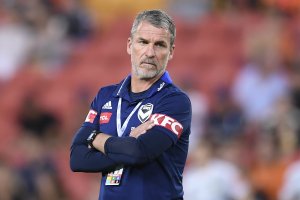
Deep in the labyrinthine bowels of Marvel Stadium, Marco Kurz cut a despondent figure as he fielded questions on Melbourne Victory’s 2-1 home defeat to Western Sydney, almost audibly sighing with each response.
“A little bit similar to last week – final passes, crossing, have a look for our target player with Ola [Toivonen],” he muttered, his lack of eye contact making it seem as if he was explaining Victory’s struggles in attack to himself as much as the assembled media.
With two home games gone and no goals from open play, the heat was already on. Click your heels all you like, Marco – you’re not in Adelaide anymore.
The German shifted uncomfortably in his seat when pressed on whether his side were over-reliant on delivery from wide areas.
“I think when the opponent is like City, Western Sydney, they play very compact in a 4-3-3, you must find the outside position.
“And we made it good, we came in the last third, but then you must find the players in the box. That is the point when you talk about crossing.
“Because it makes no sense to play the ball in the pressing situations.
“They stayed very compact and you must find, after switching sides, the outside positions.
“The only thing I can say is that we keep going, we are hard-working, and I’m sure we will score a lot of goals this season.”
Now with 13 games played, 17 goals, and 15 points, Kurz has been relieved of his duties with Victory sitting 6th on the A-League ladder. Such mediocrity will simply not do in navy blue.
Victory’s centre backs seem instructed, Jose Mourinho-style, not to play ‘first station passes’ – into the central midfielders – under any sort of pressure.
Holding players Migjen Basha and Jakob Poulsen seem to hide when the defenders have the ball, only emerging to take possession from a token hand-off when dropping between the centre backs, or into an auxiliary fullback position to take the place of a player advancing up the touchline.
The only players seemingly trusted to receive the ball under pressure are Toivonen and Robbie Kruse, dropping off the frontline to drag a marker with them and create a gap in the opposition defence.
This constitutes Victory’s one and only effective attacking idea in possession. All other chances are created in transition, when the lines are stretched and passing into midfield does not risk a turnover.
“It’s hard. The gaffer and the coaching staff have their own ideas and we as players have to stick to what they want to do,” Kruse told ESPN in December.
Even Victory’s creative talisman, a transformative influence since returning from injury, felt restricted by the rigid game plan.
Kurz’s underdog tactics and emphasis on graft over craft may have gone over well in the City of Churches, where his fist-pumping touchline antics played to the parochial self-image of South Australia’s capital.
But Melbourne Victory’s supporters are used to seeing a more attractive brand gracing Docklands and Swan Street, spoiled by years of watching Carlos Hernandez through balls, Mathieu Delpierre playing out from the back, and Ange Postecoglou’s strikerless total football.
Ironically, Kurz’s hard-man image has in the end cost him his job.
According to the Herald Sun, Kurz’s red card in Victory’s shambolic 3-2 loss to Central Coast Mariners over the weekend – in which rampaging substitute Matt Simon netted two stoppage time penalties – was the final straw.
Victory’s boardroom are a proud bunch, and Anthony Di Pietro and co. do not enjoy losing face in such a manner.
Losses they can take, for a time. To act rashly is not the Victory way. But such an embarrassment, they will not countenance.
Injuries took their toll, of course. Tim Hoogland has played just one game in the heart of defence, and Kruse, Toivonen, Andrew Nabbout, and Thomas Deng have all missed games, to name a few.
But Kurz’s regressive footballing philosophy was fundamentally incompatible with Victory’s proud history and the expectations of their supporters.
Not since Mehmet Durakovic have Melbourne Victory got a coaching appointment this wrong. The A-League’s biggest club needs to identify what they want in their next manager, and what went wrong in recruitment to lead to two mutual terminations in January.
In the meantime, prodigal son Marco Rojas returns, and the reigns are temporarily handed to Kevin Muscat’s former right-hand man, Carlos Salvachua – his inaugural press conference signaling a shift in playing style.
“First I have to adapt to the players that we have, and I have to adapt to the philosophy of the club,” Salvachua told the assembled media on Wednesday afternoon.
“I know this club is an important team in Australia, and always, always, always they try to get an attacking style, an entertaining style for the members.
“I know my idea and the idea of the club, but for sure we have to be the protagonists during the games.
“My future will be connected with the results and the performance. I know what I am as a coach, and I know what I can do here. But sorry, I cannot compare [myself] with Marco.”
Can the Spaniard recapture the glory days? Or is a greater front office overhaul required?



